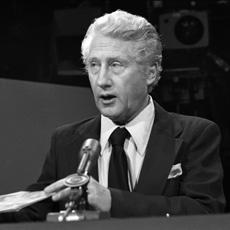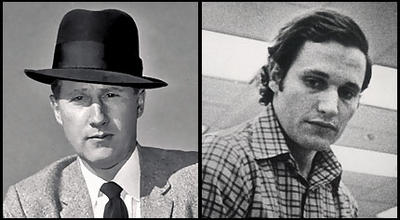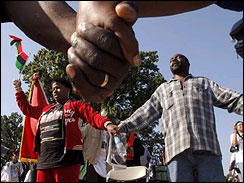 Bush & Media: Normalizing the Abnormal
Bush & Media: Normalizing the Abnormal By Robert Parry
September 21, 2005
Link HereWhat’s been so surprising about the U.S. news media’s coverage of George W. Bush’s Katrina debacle is that leading journalists finally have broken with a five-year pattern of protecting both Bush and his presidency.
Until Hurricane Katrina ravaged New Orleans – highlighting Bush’s weakness as a crisis manager, his skewed budget priorities and cronyism at key federal agencies – the national press corps had been held in sway by a mix of White House spinning and the bullying of the occasional critic.
From Election 2000 to the 9/11 terror attacks to the invasion of Iraq, the press corps often acted as if its principal duty to the nation was to normalize Bush’s often abnormal behavior, like the enabling family of a drug addict insisting nothing is wrong. While traditionally journalists play up the unusual, in Bush’s case, the media did the opposite.
This pattern can be traced back to Campaign 2000 when Al Gore became a favorite whipping boy of the national press corps, apparently still annoyed by Bill Clinton’s survival of the impeachment battles of 1998-99.
As a Consortiumnews.com article on Oct. 16, 2000, noted, “the national news media have altered the course of Campaign 2000 – perhaps decisively – by applying two starkly different standards for judging how Texas Gov. George W. Bush and his running mate, Dick Cheney, handle the truth versus how Vice President Al Gore does.
“Bush and Cheney have gotten almost a free pass. They have been allowed to utter misleading statements and even outright falsehoods with little or no notice. By contrast, Gore’s comments have been fly-specked and every inconsistency trumpeted to support the media’s ‘theme’ – reinforced by Republicans – that Gore is an inveterate liar.” [For details, see “Protecting Bush-Cheney.”]
Recount Battle
This media dynamic carried through Election 2000’s recount battle as the national press corps treated Bush as the rightful claimant to the White House even though he lost the national popular vote by more than a half million ballots and was not even the choice of a plurality of voters in the pivotal state of Florida.
During the recount, it was as if Bush could do almost anything without being held accountable by the U.S. news media. Even when Bush dispatched out-of-state thugs to intimidate vote counters in Miami, there was only limited reporting and little outrage.
Bush appeared so confident about his media immunity that his campaign paid for a post-riot celebration that featured Wayne Newton crooning “Danke Schoen” and Bush and Cheney placing a thank-you conference call to the rioters. [See Consortiumnews.com’s “W’s Triumph of the Will” or “Bush’s Conspiracy to Riot.”]
As the recount battle continued, many in the news media began to treat the notion that the votes should be counted and the candidate with the most should be declared the winner as some partisan Democratic idea. Several prominent journalists openly expressed their preference for Bush regardless of what the voters may have wanted.
Washington Post columnist Richard Cohen spoke for many colleagues when he declared that “given the present bitterness, given the angry irresponsible charges being hurled by both camps, the nation will be in dire need of a conciliator, a likable guy who will make things better and not worse. That man is not Al Gore. That man is George W. Bush.”
Cohen and other Washington journalists exhaled a collective sigh of relief when five Republicans on the U.S. Supreme Court issued an unprecedented ruling preventing a statewide recount in Florida, ending the long standoff and effectively handing the presidency to Bush.
Rather than recognizing that the Bush campaign had engineered what had the earmarks of a political coup d’etat (overturning the will of the American voters), the prevailing media view was that the nation must now put the divisive election in the past and unite behind the new leader.
The media started handling Bush’s fragile legitimacy like one might hold a delicate figurine.
In marked contrast to the taunting pre-Inauguration reporting directed at President-elect Bill Clinton in December 1992 and January 1993 – when he was seen as a bumpkin interloper from Arkansas – the elite Washington media fairly radiated with enthusiasm about the supposed “return of the adults” with George W. Bush in 2001.
The suppression of unpleasant images from the Bush transition was so thorough that three years later, when Americans watched Michael Moore’s “Fahrenheit 9/11,” many were stunned to see the dramatic challenge to Bush’s election by the Congressional Black Caucus as well as scenes of angry demonstrators disrupting Bush’s Inaugural parade.
Watergate Legacy
The longer-term explanation for the media’s kid-glove treatment of George W. Bush can be found in the strategy developed by conservatives after Richard Nixon’s ouster over Watergate and the U.S. defeat in Vietnam – both of which the Right blamed on “liberals” in the news media.
The central element of that three-decade-old conservative strategy was to build a pro-
Republican media infrastructure while also financing attack groups that would neutralize mainstream journalists who challenged the Right’s positions. [For details, see Robert Parry’s Secrecy & Privilege: Rise of the Bush Dynasty from Watergate to Iraq.]
By 2001, this Republican media machine had grown into a giant Wurlitzer of magazines, newspapers, commentators, book publishing, radio talk shows, television networks and Internet sites. It rivaled the influence of the mainstream or corporate media, where star journalists grew nervous about the risks to their careers if they got labeled “liberal.”
So, with the Republicans back in the White House in 2001, the media tendency was to praise Bush for “exceeding expectations” or to poke fun at his critics for “consistently underestimating” the President.
There were only a handful of mainstream sources persistently voicing skepticism about Bush and his policies, most notably economist Paul Krugman in the New York Times.
This Bush-friendly media dynamic gained powerful momentum after the Sept. 11, 2001, terror attacks on New York and Washington. The mass slaughter on U.S. soil generated a rally-‘round-the-President consensus, with conservatives shouting down the few remaining vocal Bush critics as traitors who were aiding and abetting the enemy.
The mainstream press corps joined in wrapping Bush in this protective P.R. cocoon, censoring out information that might raise public doubts about his leadership.
Because of that, millions of Americans also were shocked by the scene in “Fahrenheit 9/11” showing Bush sitting frozen for seven minutes in a second-grade classroom, after being told by chief of staff Andrew Card that a second plane had struck the World Trade Center and that “the nation is under attack.”
Under normal press rules, the commander in chief’s strange – almost disqualifying – behavior would have been a major news story. Certainly, the seven-minute freeze was known to members of the news media since reporters were standing in the Florida classroom as Bush continued reading “My Pet Goat.”
Instead, the excruciating seven-minute image of Bush looking like a deer in the headlights was shielded from the American people. His later stage-managed bravado – vowing revenge and pledging to get Osama bin-Laden “dead or alive” – was spotlighted.
Even today, the New York Times and other major news outlets describe the iconic scene of Bush and Sept. 11 as occurring three days after the attacks when Bush appeared with a bullhorn at Ground Zero. But for many Americans, the true iconic image of Bush on that tragic day was the scene of him sitting in the classroom with a children’s book in his lap.
Recount Results
Another early casualty of the media’s post-Sept. 11 protection of George W. Bush was the unofficial Florida recount that major news organizations had undertaken after the Supreme Court’s ruling, with the goal of judging the actual choice of the voters.
When the recount report was released two months after Sept. 11, the obvious news “lede” – that Gore would have won if all the legally cast votes were counted – was hidden by news executives who focused instead on how Bush might still have won if, hypothetically, some of the legal ballots had been excluded.
Rather than report the shocking result – that the wrong person was in the White House – most news organizations chose to normalize the abnormal with reassuring, albeit misleading, articles declaring that Bush was the rightful winner. The thinking seemed to be that no good would come from undermining the sitting President at a time of crisis. [For details, see Consortiumnews.com’s “So Bush Did Steal the White House" or “Explaining the Bush Cocoon.”]
While the news executives may have congratulated themselves for their patriotic spinning of the recount results, they were, on another level, violating journalistic ethics, which put telling the truth above achieving some pleasant political outcome.
The mis-reporting of the recount results also was not just an innocent white lie without consequence. By publishing stories that falsely enshrined Bush as the legitimate winner of Election 2000, the news executives strengthened Bush’s case for a second term in 2004 and weakened Gore’s argument for a rematch.
Indeed, still hounded in 2003 by pro-Bush activists shouting “Sore Loserman,” Gore decided not to challenge Bush, eliminating the person whom many Democrats saw as their strongest candidate in 2004.
The Iraq War
The U.S. media’s post-Sept. 11 protection of Bush also influenced his sense of invulnerability as he lurched toward a military confrontation in Iraq.
To the national press, this hailing of Bush’s war-time leadership may have been meant as hopeful encouragement to the President. It’s also possible that many well-paid journalists knew the career danger of probing too deeply into Bush’s weaknesses.
Nevertheless, the fawning coverage did more than just boost Bush’s spirits. It seems to have fed an egotism that caused Bush to discard any self-doubts.
The swelling of Bush’s head was apparent in his interview for Bob Woodward’s Bush at War, .which took a largely flattering look at Bush’s “gut” decision-making but also reported some disturbing attitudes within the White House.
“I am the commander, see,” Bush told Woodward. “I do not need to explain why I say things. That’s the interesting thing about being the President. Maybe somebody needs to explain to me why they need to say something, but I don't feel like I owe anybody an explanation.”
In The Right Man, former White House speechwriter David Frum followed a similar pattern of praising Bush’s supposed leadership skills, while acknowledging Bush’s autocratic and anti-intellectual behavior.
Bush is “impatient and quick to anger; sometimes glib, even dogmatic; often uncurious and as a result ill informed; more conventional in his thinking than a leader probably should be,” Frum wrote.
Bush would describe environmentalists as “green-green lima beans” and built a White House staff with a “dearth of really high-powered brains,” Frum wrote. “One seldom heard an unexpected thought in the Bush White House or met someone who possessed unusual knowledge.”
By comparison the TV show, “The West Wing,” with its dialogue imbued with sophisticated political thinking “might as well have been set aboard a Klingon starship for all that it resembled life inside the Bush White House,” Frum said.
Still, these warning signs were largely ignored as the media’s protect-Bush dynamic carried over into his case for war with Iraq.
Many major news organizations, including the Washington Post and the New York Times, published front-page articles accepting – or even promoting – Bush’s claims about Iraqi weapons of mass destruction while shoving the infrequent story expressing skepticism onto the inside pages.
“We were so focused on trying to figure out what the administration was doing that we were not giving the same play to people who said it wouldn’t be a good idea to go to war and were questioning the administration's rationale,” the Post’s Executive Editor Leonard Downie Jr. said in a retrospective on the WMD controversy.
“Not enough of those stories were put on the front page,” Downie said. “That was a mistake on my part.” [Washington Post, Aug. 12, 2004]
Still, Downie and other news executives have argued that it is unlikely that more critical press coverage would have deterred Bush’s determined march toward war.
But the imbalanced news coverage was not without its effects, either. The major media’s broad acceptance of Iraq’s WMD threat contributed to the marginalizing of skeptics and anti-war protesters.
Journalistic Fear
It also appears that some journalists shied away from reporting aggressively about the holes in Bush’s WMD case out of fear that caches of forbidden Iraqi weapons might later be discovered. In that case, anyone who had doubted Bush’s claims would surely be held up to scorn by the powerful conservative news media.
So, there was almost certainly a degree of self-interest – or self-protection – in the media’s acquiescence to the case for war with Iraq.
Over the past two years, the failure to find WMD and the emergence of a fierce Iraqi resistance have caused chagrin within many editorial offices. There also is a sense of guilt about the rising death toll in Iraq.
Slowly, it has dawned on more and more journalists that they fell down on their job of keeping the American people informed. By trying to look patriotic and supportive of the President, journalists had failed their real test of patriotism, telling the American the truth as fairly and fully as possible.
So, when Hurricane Katrina’s flood waters struck the Gulf Coast, not only the New Orleans levees were prepared to break. The dams protecting George W. Bush from press criticism were cracking, too.
Plus, this time when Bush again hesitated in the face of a national crisis, leading newscasters, such as NBC’s Brian Williams and CNN’s Anderson Cooper, were on scene to witness the debacle.
For once, the White House and its allies in the conservative news media couldn’t spin the reality.
 W. Mark Felt appeared on CBS' "Face The Nation" in Washington in 1976.
W. Mark Felt appeared on CBS' "Face The Nation" in Washington in 1976.



























